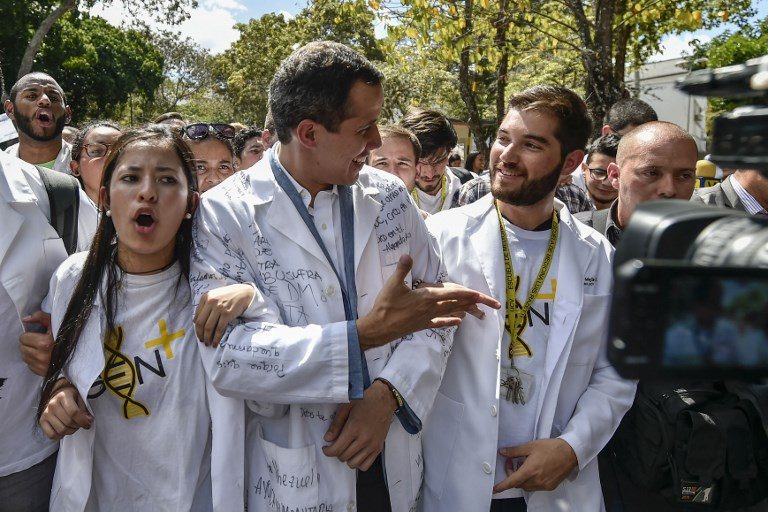SUMMARY
This is AI generated summarization, which may have errors. For context, always refer to the full article.

CARACAS, Venezuela – Opposition leader Juan Guaido appealed to his countrymen to take to the streets at the weekend for “the biggest march in the history of Venezuela” in a new bid to up pressure on embattled President Nicolas Maduro to call early elections.
Major European countries have set a weekend deadline for Maduro to call such elections or they will join the United States in recognizing Guaido, the speaker of the national assembly, as Venezuela’s interim president.
“We must all take to the streets of Venezuela and the world with a clear goal: to accompany the ultimatum given by members of the European Union,” Guaido said Thursday, January 31.
“We are going to stage the biggest march in the history of Venezuela and our continent,” he added.
He called the rally to coincide with one convened by government supporters to mark the 20th anniversary of the socialist movement founded by the late Hugo Chavez.
Guaido said elite security forces went to his home to threaten his family, blaming the government of Maduro as international support grew for his bid to oust the embattled president.
The move heightened fears for the security of the 35-year-old National Assembly leader, who declared himself acting president last week in a bold challenge to Maduro’s authority.
The police’s special action force, FAES, had gone to his home to interview his wife Fabiana Rosales, Guaido said during a speech at Caracas university.
“At this moment the dictatorship believes that it will intimidate us,” Guaido said, his wife at his side.
Earlier, European lawmakers recognized Guaido as the acting head of state – another step forward in his bid to force out the socialist leader who has presided over the oil-rich country’s economic collapse.
Several opposition leaders have been jailed in recent years as Maduro cracked down on growing dissent in the Latin American country, where resistance has escalated with Guaido’s spectacular self-proclamation.
Previously unknown to the public at large, he has become the standard bearer of the opposition to Maduro, whether on the streets or on social networks.
Deprived almost entirely of coverage on mainstream media, Guaido has deftly used the social networks to woo support, but even that avenue is increasingly being cut off, and there is an explicit ban against talking about him.
The dramatic turn against Maduro’s leftist regime culminated quickly, but it came after weeks of behind-the-scenes diplomacy including a hushed meeting in Washington with Guaido, who was quickly recognized by Washington as Venezuela’s president.
While marshaling international support, Guaido is seeking to maintain street pressure against Maduro.
Venezuela’s Supreme Court – dominated by regime loyalists – has frozen his assets and ordered him not to leave the country.
EU lawmakers’ support
On Thursday, lawmakers at the European Parliament voted to accept Guaido as “legitimate interim president of the country” — and urged the European Union to follow suit.
Four major European powers – Britain, France, Germany and Spain – have said they would do so if Maduro fails to call presidential elections by the weekend.
The US on Thursday urged all European countries to recognize Guaido, but Maduro has told the “imperialists” to wait until 2025 for new elections.
Guaido was at the main Caracas university to present his “rescue plan” for a country in economic meltdown.
“We are going to address the humanitarian emergency, stop inflation in its tracks, reactivate the oil industry and move towards the restoration of access to public goods and services,” he said to cheers.
Part of the plan unveiled by the opposition leader and his economic advisor Jose Guerra is to end exchange controls in force since 2003 and renegotiate Venezuela’s estimated $150 billion debt.
On the streets
Guaido wrote in a New York Times op-ed published on Wednesday that “clandestine meetings” had been held with members of the armed forces and security forces, who he is trying to woo with an amnesty offer.
But Guaido’s moves to court the military are fraught with risk. Last week fewer than 30 soldiers rose up against Maduro, precipitating protests that, according to the United Nations, ended with more than 40 dead and hundreds detained.
So far, the military high command has remained loyal to Maduro.
The last 10 days of political upheaval have exacerbated the general disarray in Venezuela, which has the world’s largest proven oil reserves but has suffered hyperinflation and shortages of basic necessities.
The UN says 2.3 million have fled the country, unleashing a migration crisis in South America. – Rappler.com
Add a comment
How does this make you feel?
There are no comments yet. Add your comment to start the conversation.